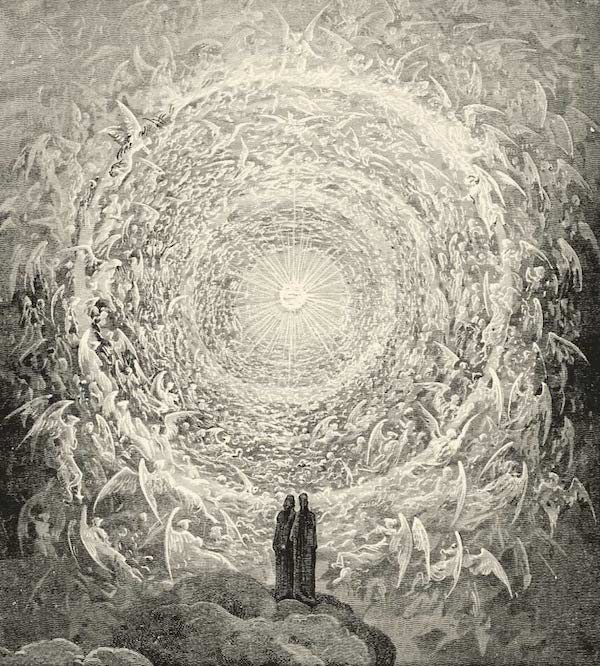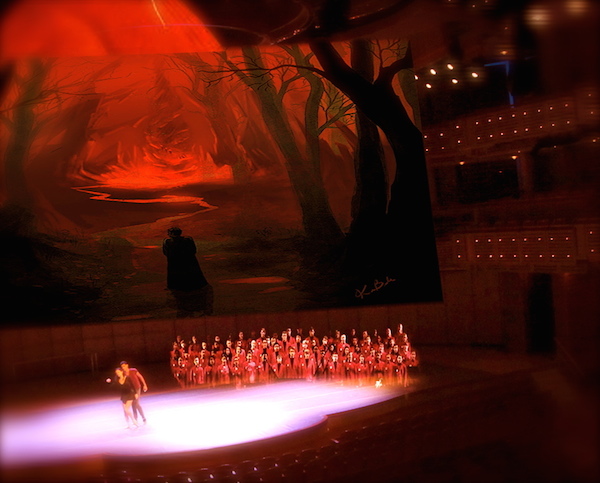
Dante Symphony to bring this season’s Mainly Mozart Festival to a dazzling end

The Paradiso begins at the top of Mount Purgatory.
The Mainly Mozart Festival’s artistic director, Marina Radiushina, doesn’t hide her excitement about the festival’s upcoming season finale, a multidisciplinary effort entailing technical and musical challenges. That’s how the Ukranian pianist describes it for our readers.
The Mainly Mozart Festival concludes this year with a very special grand finale. Could you give us an overeview of the Dante project?
In recognition of the 750th birthday of Dante Alighieri Mainly Mozart Festival will present an innovative and original production of Franz Liszt’s great Dante Symphony, inspired by Dante Alighieri’s Divine Comedy. Liszt himself was very interested in the idea of cross inspiration between different art forms. And that interest, which is manifested in his work, became the impetus for this production. Nowadays we have a few extra tools in our palette, the moving image, amplification, lighting, all the capabilities of a modern performing arts facilities to continue the tradition, bring it to our century. Following in Liszt’s footsteps we are re-imagining the re-imagined.
This production stands at the intersection of music, literature, dance and film, and we hope to provide the audiences with a full experience carefully balancing various elements. Live narration will be by the inimitable Frank Cooper who reworked the John Ciardi commentaries and translation of the poem. Liszt’s virtuoso two-piano rendition of his own Dante Symphony, originally written for orchestra, will be performed by myself and Grace Fong, a multiple piano competition winner. During the last section of the work, Magnificat, the pianists will be joined by the Miami Children’s Chorus and coloratura soprano Maria Aleida. Original choreography for this production was created by Adriana Pierce and will be performed by the Miami City Ballet dancers. Lastly, simultaneous visual narration is created by the award-winning filmmaker Ali Habashi.
Dante’s visionary notion that human love could lead to the capacity for divine love was very progressive for his time and still is very relevant today. He clearly was a man who questioned and thought deeply within the particular belief system of his time and place – Christianity. This profoundly human aspect of his work, which transcends its setting, is where our main interest lies. The audiences will be able to experience this dazzling multimedia performance at the Knight Concert Hall of the Adrienne Arsht Center, a performance that will take them on an epic journey through the infinite torment of Hell, up the arduous slopes of Purgatory, and onto the glorious realm of Paradise.
How is the Miami audience responding to the MMF?
I think that the age and endurance of the festival speaks for itself. Our attendance is growing; many of the concerts are sold out. The 2014 Season Finale concert at the Arsht Center attracted almost 2,000 people. The key to the upward trajectory of the festival’s success is two-fold. First, we are building trust in our audiences, the artistic merit and level of performances is consistently high, the atmosphere at the festival is amiable and unstuffy, which makes for a good overall experience. Second, we make an immense effort to continuously raise our own bar when it comes to quality. Foremost comes the quality of music and curatorial work. We know that our audiences want to leave a concert hall having experienced something memorable and moving, a moment of true beauty to behold. I hope that we are moving in the right direction in that respect.
Is there any chance that Miami could some day have a chamber music organization like the Chamber Music Society of Lincoln Center?
Absolutely. Miami continues its rapid ascend in terms of volume and quality of its cultural offerings, there is a lot of financial capital and, increasingly, people are looking to enrich their lives with high quality cultural experiences. And such experiences don’t always need to be extremely costly. A carefully curated chamber music setting, where an emphasis is made on programing, can deliver an extremely engaging and unique experience in a more sustainable way. Building such an organization requires an understanding that this type of high quality intimate concert experiences could co-exist and even further the longevity of other, costlier, art forms.
I feel that we are about to turn a corner of the digital communications age. People are yearning for making personal connections with one another and there is a growing need for smaller-setting gatherings that would provide an opportunity for the patrons to connect and communicate with artists, music and audience in a far more personal way.
What is essentially chamber music?
Chamber music is simply great music performed by a few musicians rather than a soloist or a large orchestra, where the interplay between instruments, blending of artistic personalities and sensitivity to the conversational aspects of music making are the focal point. The name “chamber” reflects the historically intimate setting intended for the performance of this type of music being one of the most natural and practical ways to make music, most, if not all, major composers have written in this idiom. An enormous amount of classical music masterpieces are works of chamber music. Classical music as an art form is indissoluble from its subcategory – music written for chamber settings.
What are the challenges and goals for you as artistic director of the MMF?
There are two types of challenges. One is the practical aspect of running a non-profit organization, the everyday operations and funding. We are a small operation and it puts a considerable load on my shoulders to make sure that all the aspects of the festival are attended to. It is a tough job, but one that I welcome and have been prepared for during my tenure with Ensemble ACJW in New York City and as a fellow of The Academy, a program of Carnegie Hall, the Juilliard Music School. I find that there is no magic to running an organization. It’s about meticulous everyday work and continuously making good, informed decisions.
The other type of challenge is to make sure that I have my hand on the pulse of the audience, the accuracy of the vision for the organization and merit of my artistic and programming choices. I would like to be able to build an organization that continues to grow its audience locally, maintains high artistic level of our presentations and expand our programing beyond Mainly Mozart Festival.
How do you see and feel the musical future of Miami? What do we have? What are we still missing?
In our case, perhaps surprisingly, we have a growing audience and we need to continue to provide adaptable performance formats that would dynamically sense what these audiences might want and respond to their needs faster than we have done in the past. We, as a city, have to take into consideration the unique geography of our neighborhoods and commuting challenges. Audiences have more and more entertainment choices, beyond live classical music, which are made easier to access with the advances in technology. High-level classical music experiences should be available to people throughout the city in their own neighborhoods. They should be affordable and convenient to get to. My sense is that, because of the communication bombardment, more than ever people have a genuine interest and need to carve out a few hours during the week to experience an oasis of piece and beauty, and perhaps to have a shelter from the intensity of everyday life. I think that with the right programming approach chamber music can contribute to filling that niche in the most natural way.
And finally, why is it still called Mainly Mozart when Mozart is not the main feature?
Mainly Mozart Festival has been in existence for 22 years. It’s founders, George Volsky and Frank Cooper, conceived it as a community service to the people of Coral Gables to provide classical music during the summertime for those not leaving town to escape the heat. The festival was immediately well received, which was an indication of just how much need there was for a summer season classical music series. Since then Mainly Mozart has grown and over the years evolved to adapt to the many changing conditions: several different venues, changing audiences, evolving musical landscape of the city. Mainly Mozart is no longer a community offering only to the people of Coral Gables. And while now there is much more going on now during the summer in Miami, MMF still has a special niche in that landscape and in the hearts of its devotees.
At the time of the festival conception George and Frank had an eye on the music of the Austrian tradition: Mozart and Haydn. Almost immediately they started to incorporate music of other composers as companion pieces. The audiences responded well, creating a tradition to mix and match works by various composers and styles, which we continue and expand today.
Sunday, June 21, 2015 at 4:00 pm, Knight Hall of the Adrienne Arsht Center for the Performing Arts; Tickets: $30 general, $10 students; www.arshtcenter.org or 3o5-949-6722

Recent Content
-
Artsarticle ·
-
Artsarticle ·
-
Artsarticle ·
